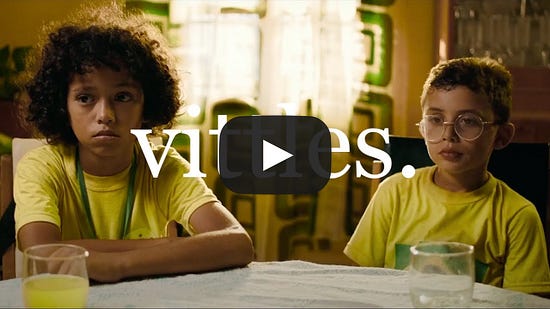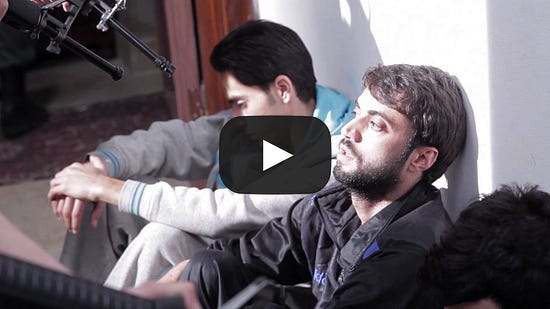Redefining the food filmFilm 1. Food and resistance in Palestinian cinema. Words and narration by N.A. Mansour; Editing by Joel Blackledge.Good morning and welcome to Vittles Season 6: Food and the Arts. All contributors to Vittles are paid: the base rate this season is £600 for writers (or 40p per word for smaller contributions) and £300 for illustrators. This is all made possible through user donations. Vittles subscription costs £5/month or £45/year ─ if you’ve been enjoying the writing then please consider subscribing to keep it running and keep contributors paid. This will also give you access to the past two years of paywalled articles. If you wish to receive the Monday newsletter for free weekly, or subscribe for £5 a month, please click below.
Film 1: A Glass of Orange Juice in Palestine.Words and narration by N.A. Mansour; editing by Joel Blackledge We recommend that you watch the film above with the sound on. Subtitles can be turned on using YouTube’s caption settings. If you are unable to watch the film then we have published the text of the narration below.The best glass of juice is not just cold-pressed or squeezed from heirloom fruit. It is the juice bought by someone else, living in their fridge until it is served to you on a sweltering day of childhood summer. Perhaps it is the juice you and your brother drank after you were chased around your neighbourhood by some bullies during the height of a FIFA World Cup. But then, a girl from your neighbourhood shelters you in her home, maybe because you’re both proud Brazil supporters. She serves you the juice in an ordinary glass, from a Tetra Pak that you could buy from a dukkan with your pocket money. However, the heat, adrenaline and camaraderie of the moment gives that glass a brightness that added flavourings cannot. Your little brother whispers for more. You ignore him. This is the mid-point of the 2019 Palestinian short film Maradona’s Legs. The film, directed and written by Firas Khoury, follows two brothers’ sticker-collecting quest during the summer of 1990, the height of the First Intifada (1987–1993). As the World Cup is played on the radio, occasionally a pirate radio breaks through, calling for Palestinians everywhere to rise up, resisting the Israeli occupation. I’ve thought for a long time about that glass of juice in Maradona’s Legs. I’ve had that glass of juice in visits to friends’ houses – the sweat beading down its side and cascading into driblets makes the juice seem even colder. Maradona’s Legs is technically a football film, with jerseys, live score updates, and team allegiances galore, but my brain fixates on those 30 seconds with the juice – and suddenly, it’s a food film, too. With every rewatch, Maradona’s Legs strikes me as distinct from other films produced by Palestinian writers and directors. It looks to a universalised notion of childhood, while weaving in detail specific to the Palestinian struggle. To me, Palestinian films often feel written for European and North American film festival markets, not necessarily for a Palestinian audience (particularly not those living in Palestine). The films are mostly dramas with crisp cinematography, and they either focus on resistance movements or a major disruption the occupation has instituted, while playing to a foreign audience’s sense that Palestinians are as violent, volatile, and patriarchal as the stereotypes suggest. But for Palestinians, the same films cut too close to home. They are not an escape from the reality of the occupation; a reality that, while ever-present, is not the subject of every conversation. I struggle when watching films like those, like Hany Abu-Assad’s Omar (2013) – notable for being largely funded by Palestinians, and its Academy Award nomination. But even so, there is a moment in Omar that reminds me of Maradona’s Legs. In this particular scene, a trio of friends – including Omar and his friend Tarek – sits at a hummus shop moments before an Israeli raid. As they tuck in, the titular Omar complains the bread isn’t fresh. Tarek responds that the bread is not as fresh as what Omar is used to, as Omar works in a bakery. But that particular bakery is across town, across the Apartheid Wall, which Omar scales regularly to see his friends and secret girlfriend Nadia (who is also Tarek’s sister). Within seconds, the armed Israeli police enter the shop looking for Omar, and the film becomes a political thriller about betrayal and the Israeli occupation. I’m not interested in the political thriller aspects of Omar which, like Hany Abu-Assad’s previous film Paradise Now (2005), go into the question of collaboration with the Israeli state. But my brain revisits the hummus scene because of its simple message – Good hummus needs good bread – making the meal not simply one of hummus, but hummus and fresh bread. Omar knows he and his friends deserve good lives of dignity, and dignity can mean fresh bread with your hummus. When I watch that scene, I hope that there is a home for that stale bread, which is ultimately abandoned as Omar and his friends are pursued through town by the Israeli occupying forces.  In Maqloubeh, a precious short film by Nicolas Damuni, a group of friends make a meal together before their apartment is raided by the Israeli army. And there it is once again: that splash of familiarity, something I recognise from the texture of my Palestinian life, like the glass of juice: it is the lively pan-Palestinian debate on the proper way to make maqloubeh/makluba. When they’re eventually attacked and hauled out of their home by the Israeli army, a couple across the way, watching the spectacle with nonchalance from their own apartment, call out: It smells like they were making makluba. As the couple dig in, they quietly bicker over whether an eggplant or cauliflower is better in makluba. Maybe it’s the best makluba they have ever had. Anyway, I keep my head down during these debates. But watching Maqloubeh, I am reminded that sometimes we really don’t have debates about gastronomical authenticity to seek out gastronomical authenticity, it’s a moment of escape that we can provide to each other as we bicker about something pointless. And as I watch the couple eat before the credits roll, I remember this reality that exists for many living in Palestine: the cross-section of society that has fiery opinions about makluba overlaps neatly with the cross-section that has experienced illegal arrest and threats to their person in their own home. Upon us Palestinians rests the necessity of documenting the Israeli occupation. And in Palestinian film, this is often limited to the most visceral of Israeli violence towards Palestinians, like bodily harm or the destruction of homes. But, to achieve its goals of displacement and genocide, the Israeli state strips the textures of our culture out of existence, and it tries to muffle our vigour – the same vigour we funnel into our food (and our unnecessary food debates). I keep watching Palestinian films because of a strong communal urge to show support for my people’s nascent film industry, in the hopes that the industry will grow into something that produces films for its own people; maybe one day I will find myself watching a Palestinian rom com. But I also watch Palestinian films because herein lies a record of how we eat: the no-nonsense sharing of food and our ability to create pockets of solace for each other. And how, in ways big and small, food shows us at our best. Whether it is the iterations of makluba, the glass of juice or the desire for fresh bread – these are little winks across the filmscape to the global Palestinian community and to no one else. And for now, this is how our films resist. Credits
You're currently a free subscriber to Vittles . For the full experience, upgrade your subscription. |
